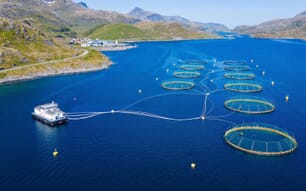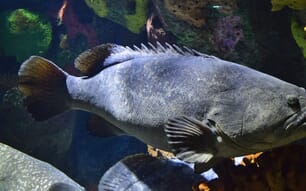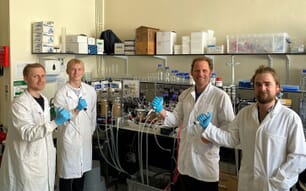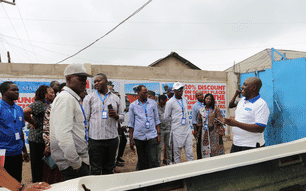Salmon require overall less feed, but the protein content of the feed must be maintained at a high level throughout their life cycle. Legumes are therefore appropriate ingredients for fish feed too.
They are easily available on the world market and reasonably priced. But they contain a number of so-called anti-nutritional substances that are alien to salmon and can have a negative effect on the growth and health of salmon.
Elvis Chikwati's doctoral research has increased our knowledge about how ingredients in feed influence intestinal functioning and health, which will make it easier to increase production of salmon while at the same time maintaining good intestinal health.
When Chikwati began work on his PhD, it was well known that the commonest and cheapest soya products result in enteritis in salmon. Chikwati set out to find out more about the mechanisms causing the effects that raw materials from legumes have on the functioning of the intestines and about what role some of the anti-nutritional agents play in causing enteritis. His overall objective was to make it easier to use such ingredients in fish feed as he set out to find the answer to three questions:
What is the first thing that happens in the intestines of salmon when they are given feed containing soya?
The answer is that after changing to a feed with soya, the way the intestines function changes very quickly. The very first change that occurred during the first two days was that the fish ate less, probably because they did not "like" the new feed. But after five days, enteritis could clearly be seen in the microscope.
At the same time, activity involving enzymes from the pancreas in the rear intestine increased, perhaps because the distal intestine, where the inflammation arises, cannot manage to digest and reabsorb these enzymes. This assumption tallies with a much lower activity of enzymes on the surface of cells in the distal intestine – enzymes that facilitate the last stage in the digestion of for example proteins and carbohydrates.
How quickly are intestinal mucosa renewed in salmon and is this process affected by temperature and by soya in feed?
The answer is that the maturation of intestinal cells, which occurs while they wander from their "place of origin" down in the folds of the intestines and up to the top, is much slower in cold-blooded salmon than in warm-blooded animals. The renewal of intestinal cells only takes a few days in mammals, but takes several weeks in salmon. Furthermore, the process was slower when the water around the salmon was 8, rather than 12, degrees.
The maturation of intestinal cells was delayed in fish that were given soya in their feed. The cells never reached full maturity. They also found their way more rapidly to the top and appeared to divide, not just down in the folds of the intestines, but also along the whole length of the intestinal fold.
How do certain anti-nutritional substances from soya affect inflammation development and the functioning of the intestines?
The answer is that saponin from soya, when given together with peas, resulted in the same inflammatory reaction as when soya was given alone. This means that the saponin is the cause of the inflammation, either on its own or in combination with other components found in legumes.
When saponins were given to the fish together with broad beans, sunflower meal, rape and maize gluten meal, they did not cause inflammation, but tended to reduce the fish's utilization of nutrients in the feed. Chikwati's studies show that other anti-nutritional agents from soya, i.e. lectin and trypsin inhibitor, also affect the function of the intestines and that the effects of these substances are different when given alone than when mixed together.
Chikwati's research has increased our knowledge of the physiology of the salmon's intestines and the way they adapt to new ingredients in feed. It also throws light on how diet-induced enteritis develops and how specific anti-nutritional substances affect the functioning and health of the intestines. This knowledge will help us to reach our aim of increasing salmon production while at the same time safeguarding good intestinal health.
Elvis ChikwatiMaster of Aquatic Medicine Elvis Chikwati defended his doctoral research on 3 December 2013 at the Norwegian School of Veterinary Science (NVH) with a thesis entitled “Diet-induced physiological and pathophysiological responses in the intestine of Atlantic salmon (Salmo salar L.) - effects of plant protein ingredients and anti-nutritional factors”.




